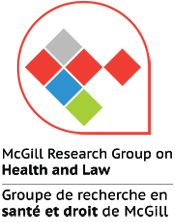"Use of Communication Technologies in Patient Care"
Conference presented as a part of Les après-midis de la justice, co-organized by the Centre de recherche en droit public and the Centre of Genomics and Policy on Tuesday, February 21, 2023 12:30-2 PM EST, NCDH 202, 3660 Peel Street.
Event website link | Link to sign up for Attestation du Barreau du Québec | Zoom link for the event

The use of communication technologies to assist in patient care has increased significantly over the last several years. Communication technologies show great potential in facilitating and possible improving communications between healthcare professionals and institutions and patients. This phenomenon can be seen particularly with increased reliance on telemedicine to improve access to care, driven in large part by the COVID-19 pandemic. Dimitri Patrinos (LL.M. candidate, McGill) will discuss the challenges the use of this remote model of health care delivery raises and the medical liability risks surrounding its implementation and use in clinical care. Professor Ma’n H. Zawati will present on the legal, ethical and policy challenges facing mhealth as well as research crowdsourcing apps in the field of genomics. He will discuss consent, confidentiality, and access to data issues. Finally, Professor Lara Khoury will comment on the use of web-based platforms for the public disclosure by healthcare institutions of quality indicators and their impact on healthcare safety and patient autonomy.
Le régime juridique applicable à la génétique dans la Loi de bioéthique révisée du 2 août 2021 avec le juge Christian Byk
25 mai 2022, Faculté de droit de McGill
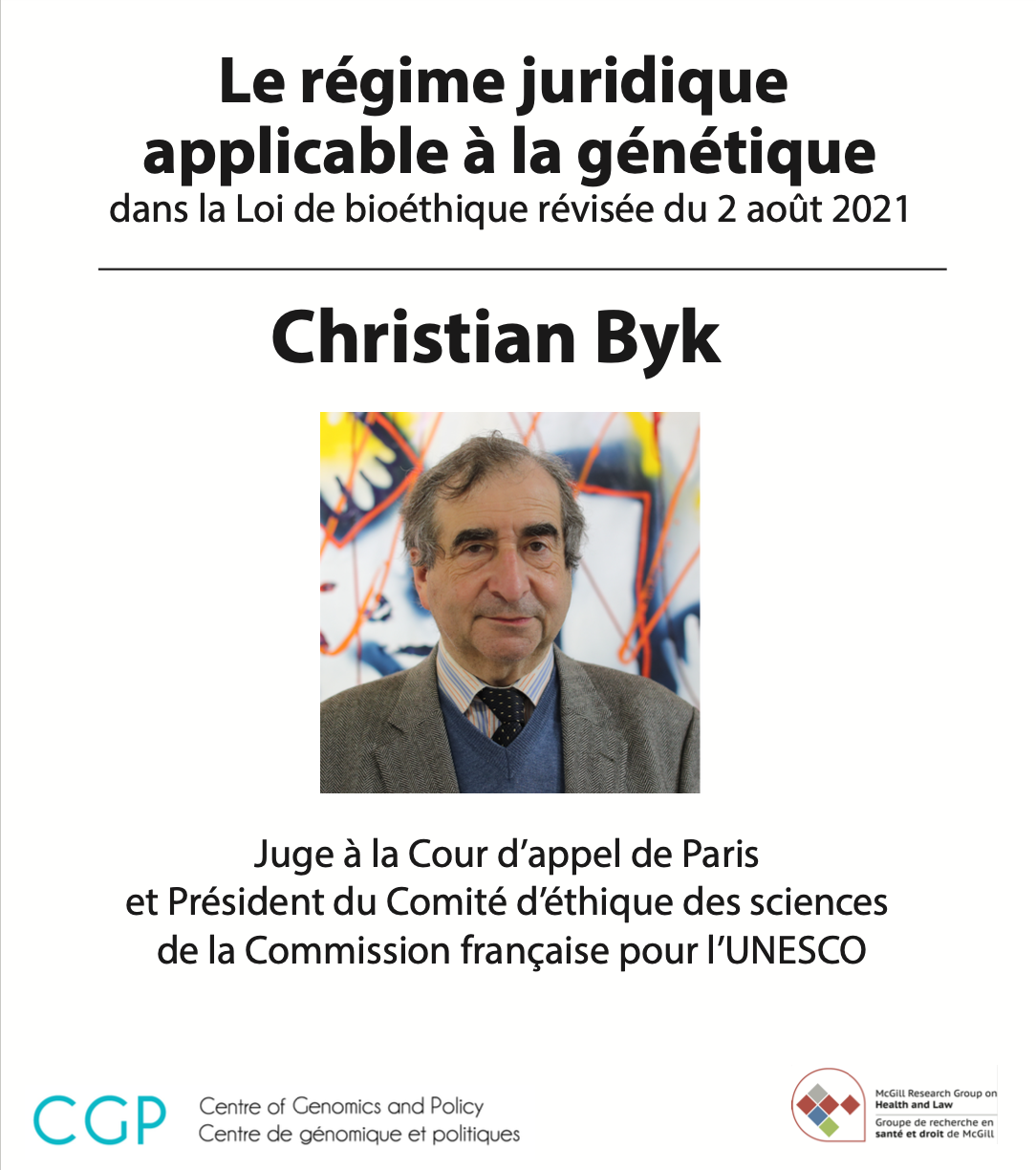
Le juge Christian Byk, de la Cour d'appel de Paris, est venu discuter de la réforme de la loi sur la bioéthique et ses impacts sur le droit de la génétique en France.
Homecoming Masterclass: Pandemic in a Pandemic - COVID-19 and Law
26 September 2020, Youtube Livestream
As part of Homecoming events, Dean Robert Leckey, BCL'02, LLB'02, moderated a timely discussion with two McGill Law faculty members.
Adelle Blackett, BCL'93, LLB'94, Ad. E., F.R.S.C., discussed her research into systemic racism, labour law, and COVID-19. In turn, Lara Khoury, Ad. E., explored how judges will respond to injuries flowing from the pandemic.
2019 Graduate Health Law Colloquium
3-4 May 2019, McGill University Faculty of Law
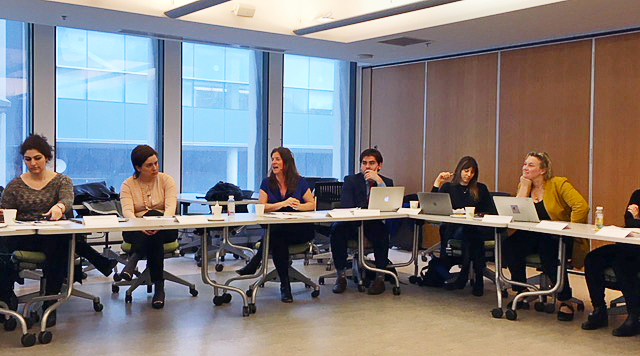
In early May, graduate students from McGill University and the University of Ottawa came together for a two day colloquium to present on research related to health law and policy. Topics included assisted reproduction in Canada, the legality of transgender reparative therapy, police use of force against persons with mental health disabilities, and medical assistance in dying. The conference was organized by McGill RGHL convenors Lara Khoury and Alana Klein and director for the Ottawa Centre for Health Law Ethics and Policy, Colleen Flood.
DataSanté: Données massives et santé publique
25 April 2019, University of Nantes, France 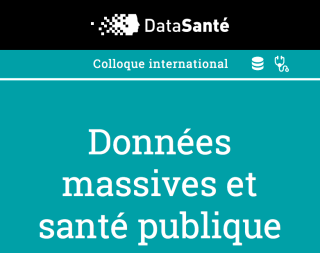
Lara Khoury, convenor of McGill's Research Group on Health and Law, along with Ma'n H. Zawati, executive director of the Centre of Genomics and Policy at McGill University both spoke at the international Data Santé colloquium at the University of Nantes. The colloquium took place on April 25, 2019 and explored big data and public health.
View the full program [.pdf].
Concilier la sécurité des produits et la responsabilité civile: la gouvernance à l’ère du risque et de l’incertitude
6-8 June 2018, Hôtel Sacacomie, Quebec, Canada
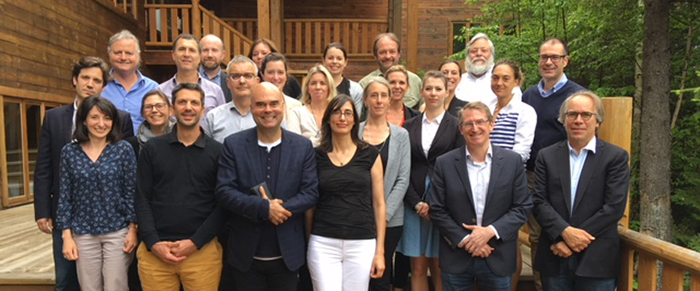
The Réseau international innovation technologique, incertitude et responsabilité held its most recent seminar on June 6-8, 2018 at Sacacomie in the Lanaudière region of Quebec. This year’s seminar was organized by Marie-Eve Arbour (Laval) and McGill RGHL convener Lara Khoury. The theme was the security and responsibility attached to products. Topics included: opioids and pharmaceutical liability, artificial intelligence, automated vehicles, tobacco, and vaccine liability. The program is available here. Read the original call for contributions (bilingual) [.pdf]
The 20th Congress of the International Academy of Comparative Law
22-28 July 2018, Fukuoka City, Japan

RGHL convener Lara Khoury and RGHL member Yann Joly participated in the 20th Congress of the International Academy of Comparative Law July 22-28, 2018 in Fukuoka, Japan. Professor Khoury participated in a panel with Professor Adelle Blackett on the “Legal Aspects of genetic testing regarding insurance and employment”.
The RGHL at the 3rd Seminar of the Research Network on Technological Innovation, Uncertainty and Responsibility
14-17 juin 2016, Université de Bretagne Occidentale, France
Prof. Lara Khoury presented on class actions law suits in environmental liability where health damages are at issue at the 3rd Seminar of the Research Network on Technological Innovation, Uncertainty and Responsibility. Consulter le ![]() programme [.pdf].
programme [.pdf].
Designing Life: The Brave New World of Genome Editing
16 March 2016, 17:30, NCDH 312

The CRISPR-Cas9 method of genome editing has given researchers unprecedented power and ease in altering the building blocks of life. The uses of this technology for combatting disease appear obvious, but the implications of establishing control over the genome are also potentially staggering. A panel of expert observers engaged in a conversation about the meaning of this technology for all of us. This well attended discussion panel was hosted by Paul Kennedy of CBC’s Ideas and was recorded for an upcoming show.
- Mr. André Picard of the Globe and Mail is an acclaimed health reporter and columnist.
- Prof. Alan Peterson (Faculty of Medicine, McGill) is a distinguished oncology researcher currently using CRISPR-Cas9 in his lab.
- Prof. Richard Gold (Faculty of Law, McGill) is the lead author of the OECD Guidelines on Licensing Genetic Inventions.
- Prof. Daniel Weinstock (Faculty of Law, McGill) is the Director of the McGill Institute for Health and Social Policy.
- Prof. Margaret Somerville (Faculty of Law, McGill) is a world-renowned thinker on medical ethics.
The Safewards Model - A talk with Len Bowers 
Thursday, October 15, 2015, 16:15-18:00, Maxwell-Cohen Moot Court
Psychiatric wards are not all the same. Some experience ten times more adverse incidents, violence, self-harm etc., than others. It is possible to have two wards at the same hospital, situated next door to one another, with one being very disturbed and the other being very quiet, yet both serving the same function and taking the same sorts of patients.
The Safewards Model explains how this can happen, and what we can do to help all our wards become quieter, calmer, more peaceful and safer places – for the patients and the staff. Interventions derived from the Safewards Model have been shown to work in a strictly randomised controlled trial – the gold standard of research evidence. In this presentation the model and the evidence behind it will be described.
Safewards has now been implemented in many places internationally, and is backed by a range of social media and online resources. The dissemination strategy and success will also be described, as will the consumer involvement that has accompanied the research programme from the beginning.
Le conférencier
Len Bowers est un infirmier diplômé en psychiatrie avec une expérience clinique et de gestion des patients requérant des soins intensifs à l’hôpital comme en communauté. Après avoir publié sa thèse de doctorat sous le titre The Social Nature of Mental Illness et un second ouvrage portant sur les attitudes positives chez les personnes ayant des troubles de la personnalité, allant chercher un lectorat élargi. Il a été Professeur à la City University (Londres), donnant le coup d’envoi à une programmation de recherche sur les soins aux patients hospitalisés et sur les moyens de réduire les conflits (violence, fugues, toxicomanie, non-observance des traitements, infraction aux règles) et sur la contention (contention chimique, isolement, surveillance spéciale, contrainte physique, etc.). Il dirige maintenant une équipe de recherche sur cette question à l’Institute of Psychiatry, Psychology and Neuroscience, a obtenu plus de 4M£ en subventions de recherche et a publié plus d’une centaine de travaux évalués par les pairs. Len Bowers donne régulièrement des conférences à l’étranger et, au Royaume-Uni, a conseillé le gouvernement britannique sur des questions de gouvernance et a contribué à la mise en place d’orientations pour la pratique des soins infirmiers en milieu psychiatrique.
Rethinking the Revolving Door: Mental Health Courts in Canada and the US
11 March 2015, 16h15-18h15, Maxwell Cohen Moot Court
The McGill Journal of Law and Health, Team VISEV, the McGill Institute of Health and Social Policy and the McGill Research Group on Health and Law organized this interdisciplinary panel with Dr. Virginia Aldigé Hiday (North Carolina State University) and Mr. Joe Wright (Ontario Review Board).
What outcomes have mental health courts generated for people with a mental illness and for the community? Gathering specialists from the legal, sociology and psychiatry fields, this panel considered the promises and shortfalls of mental health courts in Canada and the United States. The panel was moderated by Professor Anne Crocker (Dept of psychiatry, McGill) and Professor Alana Klein (Faculty of Law, McGill).
The Panelists
Joe R. Wright
Mr. Wright is currently legal counsel to the Ontario Review Board. A graduate of Queen’s University Faculty of Law, he has been a member of Legal Aid Ontario’s Advisory Committee on Mental Health Law, and also a member of the Toronto Forensic Mental Health Committee. From its inception in 1998, until 2004, he served as Mental Health Duty Counsel to Canada’s only full time dedicated mental health court, Old City Hall’s ‘102 Court’. He was responsible there for all aspects of representing accused persons, from determination of fitness to stand trial and assessment of criminal responsibility to conducting fitness hearings, bail hearings, guilty pleas and diversion of charges.
Virginia Alidé Hiday
Distinguished Professor of sociology at the North Carolina State University, Dr. Alidgé Hiday conducts studies in law and psychiatry, particularly outpatient civil commitment, mental health courts and violence, victimization and criminalization among persons with mental illness.
Première édition des Rencontres en droit de la santé
Les 28 et 29 novembre 2014 se déroulait aux Facultés de droit des Université McGill de Montréal, en collaboration avec la Faculté de droit de l’Université de Sherbrooke, le Groupe de recherche en santé et droit de McGill, le Regroupement stratégique Droit et changements et la Chaire de recherche du Canada sur la culture collaborative en droit et politiques de la santé, la première édition des Rencontres en droit de la santé sous le thème Les grands conflits en droit de la santé.
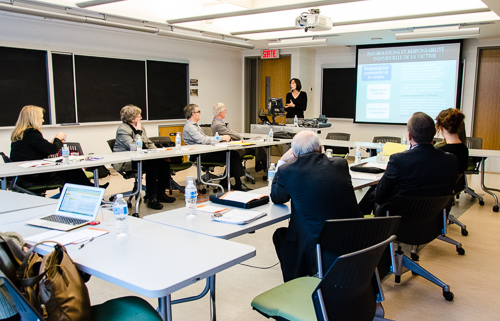
Cette rencontre regroupait des professeurs et praticiens (avocats, professionnels de la santé et décideurs publics), ainsi que des chercheurs de la France et de la Suisse dans le but d’échanger de manière approfondie sur la thématique.

Moralism and Long-Game Healthism in Public Health Ethics
September 11, 2014, 14:00-15:30, Institute for Health and Social Policy seminar room

Join us for a talk by John Coggon, Professor of Law and the Philosophy of Public Health, University of Southampton.
Building on evidence concerning the social determinants of health, a growing body of works within public health ethics has developed that sees sound health policy as being founded on concepts of social justice. However, there are scholars who deny the validity of theories that recommend the redistribution of resources with the aim of improving population health. Such protagonists advance arguments on empirical, theoretical, and normative grounds. Within public and political arenas, furthermore, we can observe a dominant position given to individual liberty, and a resistance to coercive policies, which are viewed as ‘nanny-statism’.
In parallel with the apparently irresolvable ideological debates, therefore, we find putative middle-way approaches to health policy, such as ‘nudge’. These are given as a theoretically and ethically robust — and practically realisable — means of achieving better health, without offending apparent side-constraints on what constitutes legitimate government activity.
With a focus on strategy and practical developments in relation to tobacco regulation, this paper explores political morality in long game health policies. It compares, and draws parallels between, debates on legal moralism and health promotion, and questions why concerns about moralism seem less acute when a goal—say eradication of smoking—is aimed to be achieved over decades, rather than through near-term prohibition. See poster.
Organized by the Institute for Health and Social Policy, and co-sponsored by the Montreal Health Equity Research Consortium and the Research Group in Health Law.
Location: IHSP seminar room, Charles Meredith House, 1130 Pine Avenue West, Montreal
Meeting of the Réseau Innovations technologiques, incertitude des risques et droit de la responsabilité
3-6 July 2012
The newly created international Réseau Innovations technologiques, incertitude des risques et droit de la responsabilité (Technological Innovations, Uncertainty and the Law of Liability Network) held its first meeting at the Faculty of Law of McGill University in early July, organized by Etienne Vergès (Université Grenoble 2) and Lara Khoury (McGill University).
The Network’s objective is to collaboratively examine a fundamental issue at the intersection of law and technology: the necessary transformation of the law of civil liability in response to the uncertainty of the risks associated with modern technological developments. As part of this meeting, the network members delivered presentations on their area of expertise related to the network theme.

